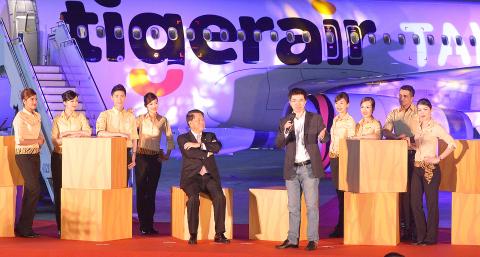China Airlines Ltd (CAL, 中華航空) yesterday announced it is to set up a low-cost carrier venture with Tiger Airways Pte of Singapore and plans to launch operations in the fourth quarter next year.
The joint venture, which has a paid-up capital of NT$2 billion (US$67.33 million), is to run a budget airline under the brand Tigerair Taiwan, which is licensed by Tiger Airways and based at the Taiwan Taoyuan International Airport.
NORTHEAST ASIA

Photo: Yao Chieh-hsiu, Taipei Times
Tigerair Taiwan aims to be a no-frills carrier providing international air travel services across Northeast Asia, including Japan, South Korea and the second-tier and third-tier cities of China.
“China Airlines’ knowledge of the Taiwan market, coupled with Tiger Airways’ expertise in the no-frills sector, should stimulate demand in the civil aviation market here,” CAL chairman Sun Hung-hsiang (孫洪祥) told a press conference.
CAL is not the only airline in Taiwan planning to enter in the low-cost carrier market.
Last month, TransAsia Airways Corp (TNA, 復興航空), which mainly serves passengers on regional and cross-strait routes, said it would establish a budget airline subsidiary within one year to meet rising demand.
The company, which mainly serves passengers on regional and cross-strait routes, said it planned to invest between NT$2 billion and NT$3 billion to operate the subsidiary.
Sun said CAL and Tiger Airways are submitting an application for regulatory approvals from the Ministry of Economic affairs and the Civil Aeronautics Administration (CAA), aiming to operate as quickly as possible.
In addition, the launch of Tigerair Taiwan will help increase CAL’s sales performance and profitability, Sun said, as CAL holds a 90 percent share in the new carrier, with its Singapore partner taking the other 10 percent.
Sun expressed optimism that Tigerair Taiwan will “absolutely” turn profit after three years of operation, with the company aiming to break even in its first year of operation.
INITIAL THREE PLANES
Tigerair Taiwan plans to buy three Airbus SAS’ 320 series aircraft, with the fleet expected to total 12 planes in 2016 or 2017.
The new joint venture is to allow Tiger Airways to extend its presence into new untapped markets in Northeast Asia, chief executive officer Koay Peng-yen (郭炳炎) said.
Tiger Airways Holding Ltd currently operates a fleet of 50 aircraft to over 50 destinations, from its bases in Singapore, Indonesia, the Philippines and Australia, while CAL operates a fleet of 75 aircraft to 109 domestic and international destinations in its network.

KEEPING UP: The acquisition of a cleanroom in Taiwan would enable Micron to increase production in a market where demand continues to outpace supply, a Micron official said Micron Technology Inc has signed a letter of intent to buy a fabrication site in Taiwan from Powerchip Semiconductor Manufacturing Corp (力積電) for US$1.8 billion to expand its production of memory chips. Micron would take control of the P5 site in Miaoli County’s Tongluo Township (銅鑼) and plans to ramp up DRAM production in phases after the transaction closes in the second quarter, the company said in a statement on Saturday. The acquisition includes an existing 12 inch fab cleanroom of 27,871m2 and would further position Micron to address growing global demand for memory solutions, the company said. Micron expects the transaction to

Vincent Wei led fellow Singaporean farmers around an empty Malaysian plot, laying out plans for a greenhouse and rows of leafy vegetables. What he pitched was not just space for crops, but a lifeline for growers struggling to make ends meet in a city-state with high prices and little vacant land. The future agriculture hub is part of a joint special economic zone launched last year by the two neighbors, expected to cost US$123 million and produce 10,000 tonnes of fresh produce annually. It is attracting Singaporean farmers with promises of cheaper land, labor and energy just over the border.

US actor Matthew McConaughey has filed recordings of his image and voice with US patent authorities to protect them from unauthorized usage by artificial intelligence (AI) platforms, a representative said earlier this week. Several video clips and audio recordings were registered by the commercial arm of the Just Keep Livin’ Foundation, a non-profit created by the Oscar-winning actor and his wife, Camila, according to the US Patent and Trademark Office database. Many artists are increasingly concerned about the uncontrolled use of their image via generative AI since the rollout of ChatGPT and other AI-powered tools. Several US states have adopted

A proposed billionaires’ tax in California has ignited a political uproar in Silicon Valley, with tech titans threatening to leave the state while California Governor Gavin Newsom of the Democratic Party maneuvers to defeat a levy that he fears would lead to an exodus of wealth. A technology mecca, California has more billionaires than any other US state — a few hundred, by some estimates. About half its personal income tax revenue, a financial backbone in the nearly US$350 billion budget, comes from the top 1 percent of earners. A large healthcare union is attempting to place a proposal before